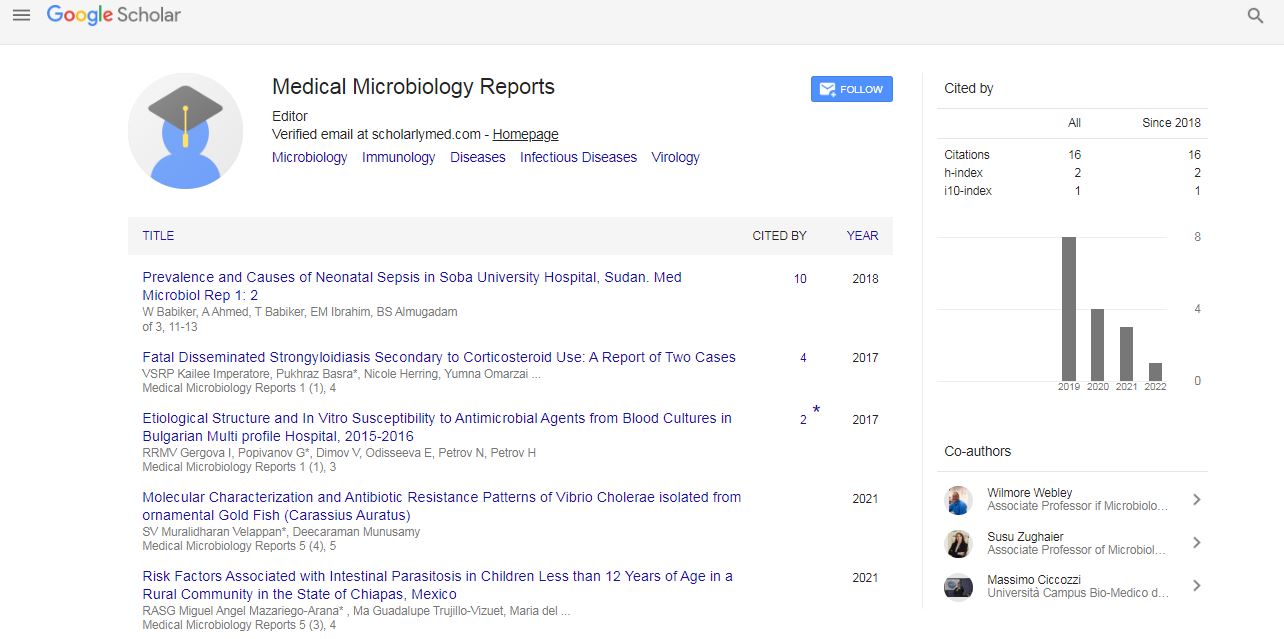Perspective, Med Microbiol Rep Vol: 7 Issue: 2
Parasite Adaptations and Host Approaches for Survival and Exploitation
Larson Khoswe*
Department of Bacteria, Parasites and Fungi, University of Copenhagen, Copenhagen, Denmark
*Corresponding Author: Larson Khoswe
Department of Bacteria, Parasites and Fungi, University of Copenhagen, Copenhagen, Denmark
E-mail: larkhos@uoc.dk
Received date: 22 May, 2023, Manuscript No. MMR-23-107466;
Editor assigned date: 25 May, 2023, PreQC No. MMR-23-107466 (PQ);
Reviewed date: 08 June, 2023, QC No. MMR-23-107466;
Revised date: 15 June, 2023, Manuscript No. MMR-23-107466 (R);
Published date: 22 June, 2023, DOI: 10.4172/mmr.1000344
Citation: Khoswe L (2023) Parasite Adaptations and Host Approaches for Survival and Exploitation. Med Microbiol Rep 7:2.
Description
Parasites, an incredibly diverse group of organisms, have evolved remarkable adaptations to survive and thrive at the expense of their hosts. Through years of coexisting with the people they infest during evolution, parasites developed surviving skills. It includes modifications that help parasites overcome the host's defenses, take advantage of resources and increase the probability of surviving and reproducing. The ability to detect and enter suitable hosts is a major adaptation. Parasites have evolved various mechanisms for host finding, including chemical cues, visual cues and even manipulating the behavior of intermediate hosts or vectors to facilitate their transmission.
Antigenic variation, in which parasites change the surface proteins to avoid immune system detection, is one method that parasites have developed to elude immunological responses. Some parasites also produce molecules that interfere with the host's immune signaling, effectively decreasing the immune response and allowing the parasite to establish a persistent infection.
The high degree of host specificity that parasites exhibit indicates their ability to have evolved to infect only particular host species or groups of related hosts. This specificity is often a result of coevolution, where parasites and hosts have shaped each other's evolutionary paths over time. By adapting to specific host environments and exploiting host resources, parasites increase their chances of survival and successful reproduction.
Many parasites have complex life cycles involving multiple hosts or life stages, which allow the hosts to exploit different ecological niches and increase the chances of transmission. For example, the life cycle of the malaria parasite involves alternating between a mosquito vector and a human host, each providing unique conditions for different stages of the parasite's development. This complex life cycle helps the parasite overcome challenges such as changes in environment, host immune responses and availability of resources.
Parasites also possess impressive reproductive strategies that ensure their survival. To increase the probability of finding new hosts, parasites frequently produce enormous numbers of progeny. Some parasites can reproduce in different ways, increasing genetic diversity and enabling parasites to adapt to the surrounding environment. Additionally, some parasites have evolved the ability to manipulate their reproduction or behavior of the hosts.
Parasites have adapted to survive in a range of challenging environments, including extreme temperatures, nutrient-poor conditions and hostile immune responses. Some parasites have developed physiological modifications to endure difficult conditions, such as the ability to form dormant stages or cysts that can resist desiccation, extreme temperatures or exposure to chemicals. These adaptations enable parasites to survive in environments where their hosts may not be present or conditions are unfavorable.
Antimicrobial resistance is a significant concern in the field of parasitology. Parasites, particularly those causing diseases like malaria, have demonstrated the ability to develop resistance to commonly used antiparasitic drugs. This adaptation arises due to genetic mutations that confer resistance to the drugs, allowing the parasites to survive and multiply despite drug treatment. Addressing antimicrobial resistance requires ongoing analysis and the development of new treatment strategies to stay ahead of these adaptive parasites.
Conclusion
A variety of approaches are used by parasites to take advantage of their hosts and secure the parasite's survival and reproduction. Parasites are professionals at adapting and surviving. The phenomenal natural adaptations are seen in the ability to overcome host defenses, utilize host resources and survive in many situations. By examining and understanding these changes, the developers may learn several things about the biology of parasites and develop approaches to fight the diseases that spread.
 Spanish
Spanish  Chinese
Chinese  Russian
Russian  German
German  French
French  Japanese
Japanese  Portuguese
Portuguese  Hindi
Hindi 
